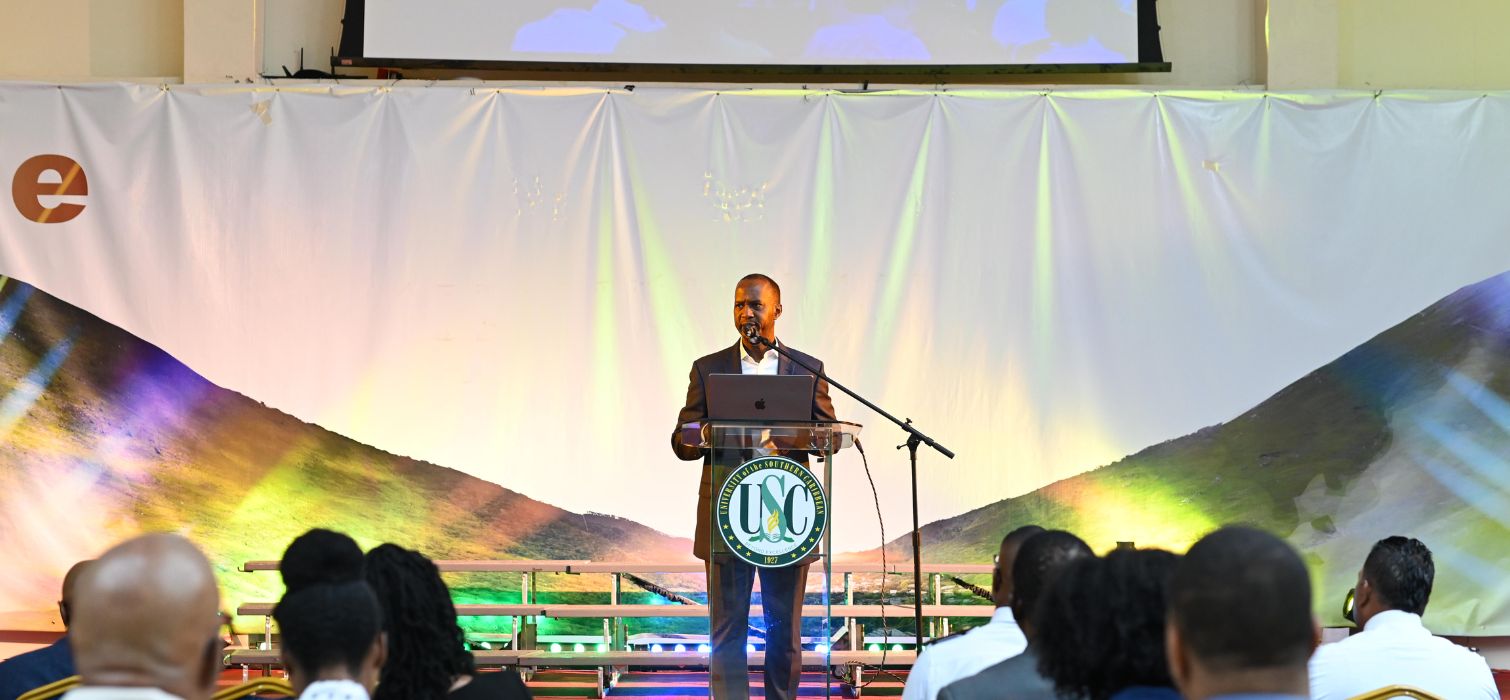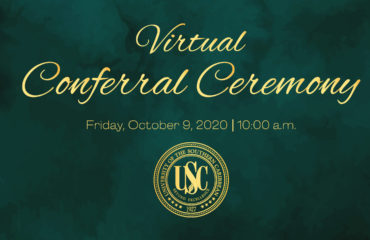By Hayden McKenna
On Friday May 03, 2024, the fourth session of the USC Leadership Academy (USCLA) was convened at the Social Sciences Auditorium on the USC Main Campus. The USCLA is arguably the flagship initiative of the actionable agenda of SP 100 (USC’s current Strategic Plan) in the area of faculty and staff development. The optimistic rationale that underpins the USCLA initiative is that the quality of the University’s survival and improvement as a thriving, relevant mission-fulfilling Adventist institution of higher learning into the foreseeable future has a direct relationship with the quality of the leadership talent it develops.

The keynote presentation was delivered by Dr. Stephen Carryl, Chief Executive Officer of The Community Hospital (TCH). Based in Cocorite Port of Spain, TCH is the oldest surviving private healthcare institution in Trinidad and Tobago. Dr. Carryl is a faithful friend and a loyal alumnus of our University. He also shares a decades-long mutually supportive friendship with USC’s President Dr. Colwick Wilson, that germinated in Cedar Hall. They both entered Caribbean Union College (now the University of the Southern Caribbean) in 1979 as Theology Majors and lodged together, at the famous Cedar Hall.
Dr. Carryl switched his academic focus to Biology and enrolled in Oakwood College (now Oakwood University) in 1981. After completing his baccalaureate degree at Oakwood, Dr. Carryl went on to Loma Linda University School of Medicine, where he earned an MD. His education and career journey also includes a Master of Health Administration (MHA) from the University of Southern California and a highly competitive surgical internship and residency at the Brookdale University Medical Center in Brooklyn, New York. Dr. Carryl is a board-certified surgeon with expertise in Laparoscopic Surgery, Bariatric Surgery and Robotic Surgery. He rose to the position of Chairman of Surgery, Chief of Perioperative Services and Director of Bariatric Surgery at the prestigious Harlem Hospital Center, before making the sacrificial decision in 2022, to bring his talents to Western Main Road, Cocorite, taking on the position as CEO of TCH.
As first-fruits of the visionary leadership of the Cedar Hall comrades – Carryl and Wilson – in September last year, TCH in partnership with USC, formally opened the TCH-USC Urgent Care Clinic. Beyond the obvious passing of the executive management of USC’s health service to TCH, this strategic partnership has added value to the Maracas Valley, St. Joseph community and has opened the door to mutually beneficial operational synergies for the two Adventist institutions.
Dr. Carryl’s keynote at the USCLA was as insightful as it was inspiring. Drawing heavily on leadership lessons we can learn from competitive sports, he sharply contrasted behaviours and habits of low morale teams with those of high morale teams. He argued that the morale of a team is the collective responsibility of the group. Members take responsibility for it and do not solely heap the responsibility on the leader.

Using the case of American Olympic gymnast Kerri Strugg and her courageous feat of vaulting on an injured left ankle in support of her team’s successful bid at winning gold in the 1996 Summer Games in Atlanta, Dr. Carryl made the point that the tolerance of pain seems to improve when you are winning. By contrast when you are losing and morale is low, everything hurts. Teams with a winning mentality are more adept at persevering and succeeding through hardship.
Dr. Carryl also used the case of the Dream Team, the USA Men’s Basketball Team that represented their country in the 1992 Summer Games in Barcelona. Although being the birthplace of basketball and having the most prestigious league in the world, at the previous Olympics in 1988, the USA could only muster bronze behind the gold of its geopolitical rival the Soviet Union and the silver of Yugoslavia. Although the US had not fielded its best possible team (professional basketball players were not selected for national duty) the agony of not winning gold felt like the Soviets had literally beaten the US at their own game! For the 1992 Olympics, the US broke with its self-imposed handicap and selected professional players to its Olympic Team. The twelve member “Dream Team” as it came to be famously known comprised of a constellation of NBA stars and one college player from Duke University. This team won gold, not dropping a single game on its way to the top of the podium. Dr. Carryl shared that the element of patriotism, playing for one’s country, for something bigger than themselves, bigger than the Larry O’brien Trophy and a championship ring, the privilege of being standard-bearers for the star-spangled banner mattered greatly to these professional athletes, many of whom were accustomed to winning. The point is that who and what you are playing for matters. Mobilizing organizational patriotism and inspiring our teams to play for the big and noble cause is critical leadership activity.
Dr. Carryl also argued that well led teams and organization ensure that there is purposive alignment of priorities and activities with vision and mission. On this matter he cautioned that organizations must avoid what he called “the trap of multiple destinations”.
Dr. Carryl selected three of John Maxwell’s 21 Irrefutable Laws of Leadership for brief discussion. The law of the lid places a realistic limit on a person’s leadership ability based on factors such as people skills, competence at planning, vision, passion for success and past results. Leaders are not able to lead teams higher than their lid.
The law of influence contends that leadership does not come with job titles or de-jure appointments. It comes rather by a person’s ability to influence others. Leaders are persons who others follow.
The law of addition says that leaders add value through serving others. Leadership does not exist where there is no value added or no legacy created and left.
Dr. Carryl’s presentation challenged participants to reflection, deep introspection and inspired action.
At this meeting of the USCLA, Mr. Clive Clark, Transport Commissioner of the Republic of Trinidad and Tobago, was present to receive the Excellence in Industry Award. Commissioner Clark, a distinguished alumnus of USC, is nationally credited for his transformative leadership at the Licensing Division of the Ministry of Works and Transportation. He has played a pivotal role in the implementation of ICT tools at the Division, resulting in the marked improvement of its operational efficiency and customer service outcomes. In his acceptance address, he expressed his gratitude to USC for giving him his foundation. He also shared his observation that USC graduates employed at the Division, stand out for their superior work ethic and the contributions they make.



